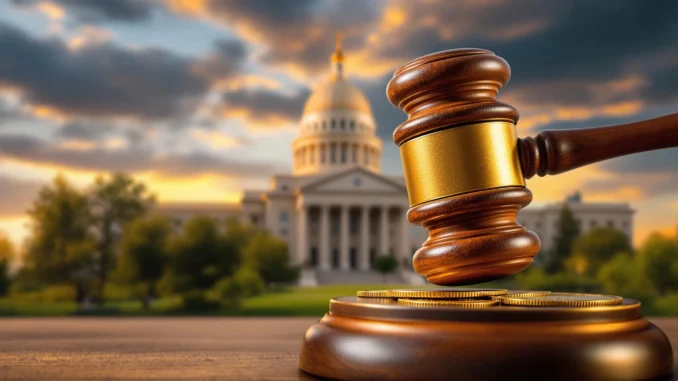
The crypto world watched with bated breath as South Dakota considered a bold move: investing state funds into Bitcoin. Imagine a state government dipping its toes into the digital gold rush! But hold your horses, crypto enthusiasts. The brakes have been slammed on this groundbreaking idea, at least for now. Let’s dive into the details of why South Dakota lawmakers decided to defer House Bill 1202, a bill that proposed allocating a portion of state funds to Bitcoin. Was it fear, caution, or just legislative timing? Let’s uncover the layers of this fascinating development in the heartland of America.
South Dakota Bitcoin Investment Bill: A Promising Idea Derailed
House Bill 1202, championed by Representative Logan Manhart, aimed to permit South Dakota to invest up to 10% of its state funds in Bitcoin. This wasn’t just a small step; it was a potentially giant leap towards mainstream Bitcoin adoption by a US state. Think about it – a state government holding Bitcoin as part of its reserves! The bill generated significant buzz within the crypto community, seen as a potential catalyst for other states to follow suit. However, despite the initial enthusiasm, HB 1202 faced an unexpected roadblock.
What Happened to the Crypto Bill?
The bill was ultimately “deferred” by South Dakota lawmakers. In legislative terms, deferral often means a polite way of saying “killed” – at least for the current legislative session. With session limits looming, HB 1202 simply ran out of time. While not an outright rejection, this deferral effectively puts the brakes on South Dakota becoming a pioneer in state Bitcoin reserve strategies. Representative Manhart, the bill’s sponsor, suggests a possible reintroduction in 2026, indicating this isn’t necessarily the end of the road, but rather a pause.
Why the Sudden Halt on Bitcoin Adoption?
Several factors could have contributed to the deferral of this ambitious crypto bill:
- Legislative Timetable: Legislative sessions are often packed, and not all bills make it through the complex process in time. HB 1202 might have simply fallen victim to the clock.
- Risk Aversion: Investing state funds, especially in a volatile asset like Bitcoin, is a significant decision. Lawmakers might have felt the need for more deliberation, research, or public consultation before committing to such a move.
- Regulatory Uncertainty: The regulatory landscape for cryptocurrencies is still evolving. Lawmakers might be hesitant to invest state funds in Bitcoin amidst ongoing debates and potential future regulatory changes.
- Public Opinion: While the crypto community is largely supportive, broader public opinion on state Bitcoin investments might be mixed. Lawmakers need to consider the views of their constituents.
The Broader Context: State-Level Bitcoin Initiatives and Trump’s Crypto Push
South Dakota’s Bitcoin investment bill wasn’t operating in a vacuum. It’s part of a larger trend of state-level initiatives exploring cryptocurrency adoption. Several states are considering or have considered various crypto-related legislation, ranging from accepting Bitcoin for taxes to creating state-level digital asset reserves. This movement also aligns with broader national conversations, notably including former President Trump’s vocal support for a national crypto stockpile.
Trump’s Crypto Stance: A National Bitcoin Reserve?
President Trump has recently voiced strong support for cryptocurrencies, even suggesting the United States should create a national crypto stockpile. This endorsement adds significant weight to the conversation around Bitcoin and digital assets. His perspective, advocating for the US to be a leader in the crypto space, could influence state-level policies and potentially reignite interest in initiatives like South Dakota’s HB 1202 in the future.
Legal Challenges and Roadblocks for Crypto Bills
Despite the growing interest, state-level crypto bills often face legal hurdles and practical challenges. Cointelegraph, in its report, highlighted the legal complexities and potential pushback these initiatives often encounter. These challenges can range from questions about the legality of investing public funds in volatile assets to concerns about custody, security, and regulatory compliance. Navigating these legal and logistical complexities is crucial for any state considering venturing into Bitcoin or other cryptocurrencies.
What Does This Mean for the Future of State Bitcoin Reserves?
South Dakota’s deferred bill serves as a reminder that the path to mainstream Bitcoin adoption, even at the state level, is not always smooth. While the idea of states holding Bitcoin reserves is gaining traction, it’s still in its early stages. Here’s what we can glean from this situation:
- Patience is Key: Significant policy changes take time. The deferral in South Dakota highlights the need for persistent advocacy and education to build consensus among lawmakers and the public.
- Education and Dialogue: Addressing concerns about volatility, security, and regulation is crucial. Open discussions and educational initiatives can help alleviate fears and build trust in Bitcoin as a potential state asset.
- Focus on Long-Term Benefits: Advocates need to emphasize the potential long-term benefits of Bitcoin adoption, such as diversification, inflation hedging, and positioning the state at the forefront of technological innovation.
- Incremental Steps: Perhaps smaller, incremental steps might be more palatable initially. Instead of a 10% allocation, starting with a pilot program or a smaller percentage could build confidence and demonstrate the viability of state Bitcoin reserves.
Actionable Insights: What Can Crypto Enthusiasts Do?
For those passionate about Bitcoin adoption and state-level initiatives, here are some actionable steps:
- Stay Informed: Keep track of legislative developments in your state and others. Websites like Cointelegraph and industry news outlets are excellent resources.
- Engage with Lawmakers: Reach out to your state representatives and senators. Express your support for crypto-friendly legislation and share educational resources.
- Join Local Crypto Communities: Connect with local crypto groups and organizations. Collective action can amplify your voice and impact.
- Educate Others: Talk to friends, family, and community members about Bitcoin and its potential benefits. Address their concerns and misconceptions.
Conclusion: The Bitcoin Journey Continues
While South Dakota’s Bitcoin investment bill faced a setback, the broader movement towards crypto adoption is far from over. The deferral of HB 1202 is a pause, not a full stop. It underscores the complexities and challenges involved in integrating Bitcoin into traditional financial systems, even at the state level. However, with continued dialogue, education, and persistent advocacy, the vision of states holding Bitcoin reserves remains a compelling possibility. The journey towards mainstream crypto adoption is a marathon, not a sprint, and every step, even a temporary pause, provides valuable lessons and insights for the road ahead. Keep watching this space – the crypto revolution is still unfolding!



